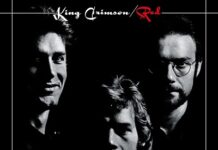After numerous reissues of the early 70s Emerson, Lake & Palmer catalog, BMG has finally refreshed the band’s three studio albums from the late 70s — Works, Vol. 1, Works, Vol. 2, and Love Beach. Stylistically, these records were a vast departure from the bombastic, Hammond-heavy proggers that brought the band their fame and riches. It was a risky move, but for the three perfectionists who always pushed boundaries and challenged expectations, it had to be done.
After wowing a crowd of 250,000 at the California Jam on April 6, 1974, and wrapping up yet another successful world tour five months later, the road-weary ELP took a break for the next three years. Well, not exactly. In all actuality, Keith Emerson, Greg Lake and Carl Palmer started to focus on their own individual musical visions — each remarkably dissimilar from the other. Solo albums seemed eminent, but then the idea of a double album of Emerson, Lake & Palmer solo sides with a fourth group side took hold and resulted in what became Works, Vol.1.
For many fans of Tarkus, Trilogy and Brain Salad Surgery, tracking Works, Vol. 1 for the first time was both a jarring and exhilarating experience. You wanted to hear Emerson’s roaring Hammond and wild Moog out in front, Lake’s booming bass and authoritative vocals, and Palmer’s otherworldly percussive movements. That’s not exactly what Works is about.
Instead, Emerson used side one for his “Piano Concerto No.1.” The man always wanted to be regarded as a serious composer, so instead of strong-arming B3s and squeaking synths like a mad scientist, he went the tux and tales route with a real, bona fide concerto conducted by John Mayar and given perpetuity by the London Philharmonic Orchestra. Lake lightened his touch with five songs to highlight his rich, baritone voice. Employing an orchestra, a wide range of instrumentation and lyrics by longtime co-writer Pete Sinfield, the singer opened with the epic “Lend Your Love To Me Tonight,” tip-toed through the intimately cosmopolitan “C’est La Vie,” and got wild and jazzy on “Hallowed By Thy Name.” Surely, he was out to prove he could croon with the best of them.
The second Works, Vol.1 disc begins with Palmer performing hyped-up instrumentals that touch on classical, jazz and rock, and playing with different musicians, among them guitarist Joe Walsh. A remake of “Tank,” which first appeared on ELP’s self-titled debut album, features Emerson and a full assault of horns and strings, The disc ends with the album’s two tracks featuring the trio together.
The explosive arrangement of Aaron Copland’s “Fanfare For The Common Man” became a fan favorite and live staple. It is followed by an ambitious conceptual piece called “Pirates.” The song features one of Lake’s most powerful and passionate vocals, reciting Pete Sinfield’s adventure-filled lines, true to the spirit and bluster of the subject matter. Emerson’s unbridled turns on his new Yamaha GX-1 synthesizer, underscored by a wave of orchestration, gives “Pirates” the proper zing for ELP immortality.
Making up for lost time, Works, Vol. 2 arrived eight months later, much to the confusion of those still trying to figure out Works, Vol. 1. Like its predecessor, it included solo pieces — Emerson’s “Honky Tonk Train Blues,” Lake’s “I Believe In Father Christmas” (which was actually released as a single in 1975), and Palmer’s “Bullfrog” are the three standouts — balanced with a fair selection of group compositions. Once again, Emerson’s abrasive Hammond sound is replaced by a lighter barrage of keyboards and Lake’s guitars.
“Tiger In The Spotlight” and “When The Apple Blossoms Bloom In The Windmills Of Your Mind I’ll Be Your Sunshine” (whew) sparkle with ELP’s smooth touch and steady rhythm. “Brain Salad Surgery,” swings with the same bounce of the old ELP and would sound slightly out of place on the album from which it takes its name. Lake’s “Watching Over You,” along with “C’est La Vie” from Works, Vol. 1, is right up there with “Lucky Man” and “From The Beginning.” There are shades and shadows of what everyone loves about ELP, despite the stamp of “leftovers” critics branded Works, Vol. 2 with.
The rest of the remaster is filled out with Works Live, a double set released in 1996 that was actually an expanded reissue of 1977’s In Concert. The 14 live tracks, recorded on August 26, 1977, at Olympic Stadium in Montreal (the last show ELP was accompanied by a full orchestra), includes “Fanfare For The Common Man,” “Knife Edge,” “Pictures At An Exhibition” and the third movement of Emerson’s “Piano Concerto.” This double-disc reissue more than makes up for whatever faults haunt the original Works, Vol. 2.
Which brings us to ELP’s most discordant album — Love Beach. As their final studio record of the 70s — as well as the last record they made together until 1992 — Love Beach came at a time when progressive rock was losing steam, and punk and disco were moving in. Bands like ELP, Yes and Genesis all made concessions to stay in the game. All these bands were with Atlantic Records, and the label’s bosses pressed each to make their music more radio-friendly with shorter, punchier songs. In ELP’s case, this overt attempt at being “commercial” lead to the group’s demise.
Love Beach is a mixed bag of the best and worst of Emerson, Lake & Palmer. Its excruciating cover with the band’s three members looking tan, trim and exceedingly happy on a Bahamian beach was an immediate turn-off for longtime, loyal fans. What happened to the intense and serious faces that graced the cover of Trilogy? The album’s first side was dominated by Greg Lake songs — simple, guitar-oriented tracks about whimsical topics like love and fun in the sun. “All I Want Is You,” “Love Beach,” “Taste Of My Love” and “For You” were all targeted for the Top 40. Instead, they fell on deaf ears and disenchanted hearts.
Fortunately, there are a few gems tucked in the grooves of Love Beach. The adaptation of Spanish composer Joaquín Rodrigo’s “Canario,“ from his guitar concerto, “Fantasia Para Un Gentilhombre,” is executed in the same spirit and verve as Aaron Copland’s “Hoedown” and “Fanfare For The Common Man.” The album’s second side is taken up with a four-part conceptual piece called “Memoirs Of An Officer And A Gentleman.” Although it bears a more straightforward theme than previous extended ELP suites, there’s enough rigorous heavy lifting to sustain the listener. Today, it stands as one of the band’s great unheralded epics.
The 2017 remaster of Love Beach includes a few extras fans will appreciate. This includes alternate outtakes of “All I Want Is You,” “Taste Of My Love,” “The Gambler,” “For You” and “Honourable Company (A March),” the fourth section of “Memoirs Of An Officer And A Gentleman.” There are also rehearsal recordings of “Canario” and other sections of “Memoirs Of An Officer And A Gentleman.” Those along with a booklet of extensive liner notes and additional photos featuring the members of ELP posing along the Nassau shoreline make it a worthy must-have.
The Works, Vol. 1, Works, Vol. 2, and Love Beach remasters are available as standalone sets, as well as part of the upcoming Fanfare: Emerson, Lake & Palmer 1970-1997, which includes the group’s 11 studio albums, including 1992’s Black Moon and 1994’s In The Hot Seat, plus lots of savory extras. With the passing of Keith Emerson and Greg Lake in 2016, Emerson, Lake & Palmer is a memory fans around the world still covet and cherish. Thankfully, through carefully constructed remasters and retrospectives, their music and their legacy will carry on for generations to come.
~ Shawn Perry




















